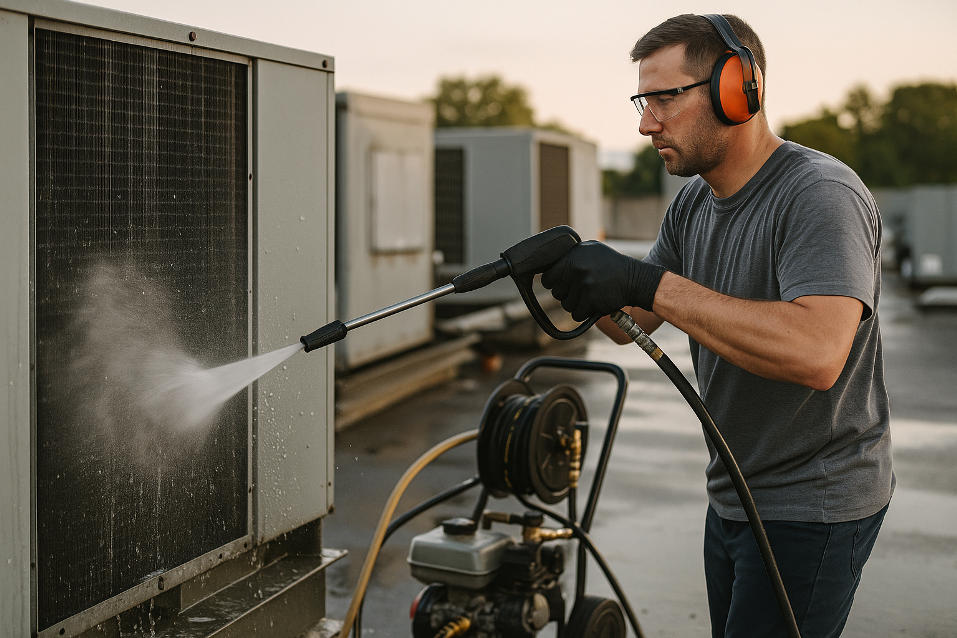Why Equipment Cleaning Goes Beyond Daily Wipe-Downs
Most facilities rely on their staff or janitorial teams to wipe down equipment at the end of the day. While this helps control surface mess, it doesn’t stop residues from building up inside crevices, vents, or hidden components. Over time, grease, dust, and debris accumulate where cloths and mops can’t reach.
- Kitchen appliances hold layers of grease around burners and hinges.
- Industrial machinery collects fine dust inside belts and moving parts.
- Retail equipment like forklifts or HVAC units trap dirt in areas that go unnoticed.
This type of buildup creates risks that a basic wipe-down cannot solve, which is why many businesses turn to professional equipment deep cleaning to go further than surface care.
What is Equipment Deep Cleaning?
Equipment deep cleaning is the thorough removal of embedded grease, grime, and debris from machinery and commercial tools. It’s not just about improving appearances. It’s about restoring equipment to safe, efficient operating condition.
The process typically involves:
- Disassembling accessible components to uncover hidden buildup.
- Steam cleaning and degreasing to remove stubborn residues.
- Sanitizing food-contact areas to meet strict safety standards.
By addressing what daily cleaning can’t reach, deep cleaning prevents long-term wear and keeps operations running smoothly.
Risks of Dirty Equipment
Failing to schedule deep cleaning leads to problems that go far beyond dust or odors:
- Fire hazards, as grease and dust are combustible.
- Pest attraction, especially in food service settings where residue provides a food source.
- Compliance risks, including failed health inspections or OSHA violations.
- Mechanical strain, where dirt and grease interfere with moving parts.
- Reduced lifespan, as buildup corrodes surfaces and shortens equipment life.
For managers, the cost of neglect almost always outweighs the investment in deep cleaning dirty equipment that supports both safety and efficiency.
Key Industries That Benefit
Every sector relies on specialized equipment that requires periodic deep cleaning. Some examples include:
- Restaurants and food service: Fryers, ovens, grills, and refrigeration units where grease buildup is common.
- Manufacturing: Assembly line machinery, conveyors, and robotic arms exposed to dust and production debris.
- Retail and warehouses: Forklifts, HVAC systems, and material handling equipment that accumulate dirt in high-traffic spaces.
Across industries, the principle is the same: clean equipment operates better, lasts longer, and supports a safe working environment.
Professional Equipment Deep Cleaning vs. In-House Efforts
Some businesses attempt to assign deep cleaning to staff or janitorial teams. While effective for routine upkeep, these efforts rarely compare to professional services.
- Professionals use specialized tools such as HEPA vacuums, high-heat steam systems, and food-safe degreasers.
- Trained technicians know how to handle delicate or complex machinery without damaging it.
- Insured crews reduce liability for businesses.
- Work is scheduled during off-hours, minimizing disruption.
By comparison, in-house cleaning is more suited to surface-level care. Deep cleaning requires the kind of expertise often provided by companies that focus exclusively on professional equipment deep cleaning services.
Methods Used by Professionals
The process varies depending on the industry, but some proven methods include:
- Degreasing agents for thick build-up on kitchen appliances.
- Steam cleaning for sanitization without flooding equipment.
- HEPA vacuuming to capture fine dust without redistributing it.
- Food-safe sanitizers where compliance is critical.
- Partial disassembly to reach hinges, vents, and hidden compartments.
This multi-step approach ensures that every part of the equipment is treated, not just the visible surfaces.
Frequency Recommendations for Equipment Deep Cleaning
Establishing a schedule depends on usage intensity and industry standards:
- Food service: Monthly cycles to stay ahead of grease and food residue.
- Warehouses and manufacturing: Quarterly treatments to prevent dust buildup.
- Low-use or specialty equipment: Annual deep cleaning with inspections in between.
Many service providers even tailor regional programs—for example, equipment deep cleaning in Toronto—to meet the specific demands of high-traffic industries. Facilities that build these cycles into their preventive maintenance programs avoid the sudden downtime caused by neglected equipment.
Signs Your Equipment Needs Deep Cleaning
Often, machinery will show clear signs that it’s overdue for deep cleaning:
- Burnt odors coming from kitchen appliances.
- Sticky residue that resists standard wiping.
- Uneven heating or cooling in food service equipment.
- Visible grease or dust layers that linger even after daily cleaning.
- Failed safety inspections tied to sanitation.
Recognizing these red flags early prevents costly breakdowns and ensures compliance.
Building a Preventive Maintenance Program
The best results come from pairing daily janitorial routines with scheduled professional deep cleaning. By integrating these services into preventive maintenance plans, businesses can:
- Extend the lifespan of critical equipment.
- Reduce emergency repair costs.
- Stay audit-and-inspection-ready year-round.
Many companies now treat deep cleaning as part of a broader operational strategy. For example, platforms like Work Clean highlight how structured cleaning programs can reduce risks and improve workplace culture by making cleanliness part of daily operations.
When combined with Steam Cleaning Services, High-Level Dusting Services, and broader Commercial Cleaning Programs, equipment deep cleaning becomes one piece of a complete facility solution.
Protect Your Facility with Equipment Deep Cleaning
Commercial equipment represents a major investment. Keeping it clean ensures it runs efficiently, meets safety standards, and reflects well on your brand. Neglecting it, on the other hand, creates risks that can damage both reputation and bottom line.
👉 Book an Equipment Deep Cleaning Assessment today and keep your equipment safe, efficient, and inspection-ready.



Recent Comments